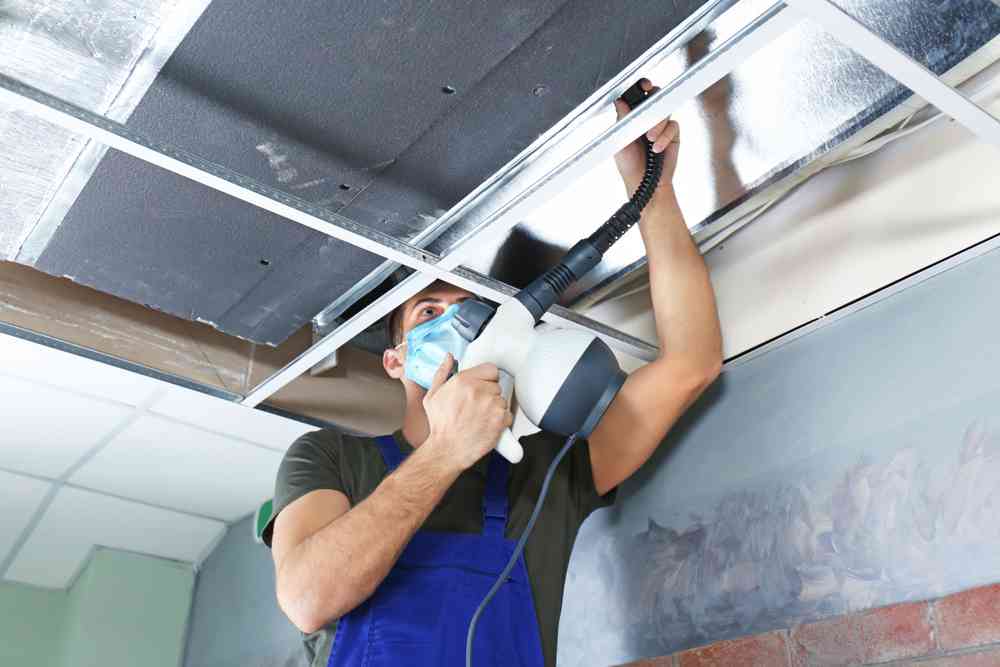Tips for Cleaning Organic Matter From Kitchen Exhaust Systems

Ontario-wide Kitchen Exhaust and Hood Cleaning – Best prices and service guaranteed.
Kitchen exhaust systems play a crucial role in maintaining a clean and healthy environment in commercial kitchens. However, over time, these systems can become clogged with organic matter such as grease, oil, and food particles. This buildup not only affects the efficiency of the exhaust system but also poses a fire hazard. Therefore, regular cleaning and maintenance of kitchen exhaust systems are essential. In this article, we will explore some valuable tips for effectively cleaning organic matter from kitchen exhaust systems.
The Importance of Cleaning Kitchen Exhaust Systems
Ontario-wide Kitchen Exhaust and Hood Cleaning – Best prices and service guaranteed.
Before diving into the cleaning tips, let’s understand why it is crucial to keep kitchen exhaust systems clean:
- Fire Prevention: Grease and oil buildup in kitchen exhaust systems can easily ignite, leading to a potentially devastating fire. Regular cleaning helps reduce this fire risk.
- Improved Air Quality: A clean exhaust system ensures that smoke, odors, and harmful pollutants are effectively removed from the kitchen, providing a healthier environment for both employees and customers.
- Enhanced Efficiency: When an exhaust system is clogged with organic matter, it becomes less efficient in removing smoke and steam from the kitchen. Regular cleaning helps maintain optimal performance.
- Compliance with Regulations: Many jurisdictions have specific regulations and codes regarding the cleanliness of kitchen exhaust systems. Regular cleaning ensures compliance with these regulations and avoids potential penalties.
Ontario-wide Kitchen Exhaust and Hood Cleaning – Best prices and service guaranteed.
Tips for Cleaning Kitchen Exhaust Systems
Now that we understand the importance of cleaning kitchen exhaust systems, let’s explore some effective tips to remove organic matter:
1. Schedule Regular Cleaning
Establishing a regular cleaning schedule is crucial to ensure that organic matter does not accumulate in the exhaust system. The frequency of cleaning depends on the volume of cooking and the type of food being prepared. High-volume kitchens may require cleaning every month, while low-volume kitchens can be cleaned every three to six months.
Ontario-wide Kitchen Exhaust and Hood Cleaning – Best prices and service guaranteed.
2. Use Proper Protective Gear
Before starting the cleaning process, it is essential to wear appropriate protective gear, including gloves, goggles, and a mask. This protects against exposure to harmful chemicals and ensures personal safety.
3. Disconnect Power and Gas Supply
Prior to cleaning, it is crucial to disconnect the power and gas supply to the kitchen exhaust system. This prevents any accidents or injuries during the cleaning process.
4. Remove and Clean Filters
The first step in cleaning the exhaust system is to remove and clean the filters. These filters are designed to trap grease and oil particles. Depending on the type of filter, they can be cleaned using hot water and degreasing agents or replaced entirely.
Ontario-wide Kitchen Exhaust and Hood Cleaning – Best prices and service guaranteed.
5. Scrub the Ductwork
The ductwork is the pathway through which air and smoke travel in the exhaust system. Over time, it can accumulate a significant amount of grease and organic matter. Scrubbing the ductwork with a brush and a degreasing agent helps remove this buildup. It is important to pay extra attention to areas with heavy grease accumulation.
6. Clean the Exhaust Fan
The exhaust fan is another critical component of the kitchen exhaust system. It is responsible for pulling air and smoke out of the kitchen. Cleaning the fan blades and motor housing helps maintain its efficiency. Use a degreasing agent and a brush to remove any grease or dirt buildup.
Ontario-wide Kitchen Exhaust and Hood Cleaning – Best prices and service guaranteed.
7. Inspect and Clean the Hood
The hood is the visible part of the exhaust system that is located above the cooking area. It is essential to inspect and clean the hood thoroughly. Remove any grease or oil buildup using a degreasing agent and a cloth. Pay attention to the corners and edges where grease tends to accumulate.
8. Clean the Exhaust Vent
The exhaust vent is the final component of the kitchen exhaust system. It is responsible for expelling the air and smoke outside the building. Inspect and clean the vent to ensure it is free from any obstructions or buildup. Use a brush or compressed air to remove any debris.
Ontario-wide Kitchen Exhaust and Hood Cleaning – Best prices and service guaranteed.
Case Study: The Impact of Regular Cleaning
A study conducted by a leading kitchen exhaust cleaning company found that regular cleaning of kitchen exhaust systems significantly improved their performance and reduced fire risks. The study analyzed 100 commercial kitchens that underwent regular cleaning versus 100 kitchens that did not receive regular cleaning.
The results showed that kitchens with regular cleaning had:
- A 30% reduction in grease buildup in the exhaust system.
- A 40% decrease in fire incidents related to the exhaust system.
- A 20% improvement in air quality within the kitchen.
- A 15% increase in the overall efficiency of the exhaust system.
Ontario-wide Kitchen Exhaust and Hood Cleaning – Best prices and service guaranteed.
This case study highlights the importance of regular cleaning in maintaining a safe and efficient kitchen environment.
Ontario-wide Kitchen Exhaust and Hood Cleaning – Best prices and service guaranteed.
Cleaning organic matter from kitchen exhaust systems is crucial for fire prevention, improved air quality, enhanced efficiency, and compliance with regulations. By following the tips mentioned in this article, such as scheduling regular cleaning, using proper protective gear, and thoroughly cleaning each component of the exhaust system, you can ensure a clean and safe kitchen environment. Remember, regular cleaning not only reduces fire risks but also improves the overall performance of the exhaust system, providing a healthier and more efficient workspace for everyone involved.
Learn more about “Easiest Method to Clean Organic Matter From Kitchen Exhaust Systems” here.
Frequently Asked Questions about Tips for Cleaning Organic Matter From Kitchen Exhaust Systems

What are the primary areas to focus on when cleaning organic matter from kitchen exhaust systems?
When cleaning kitchen exhaust systems, focus on:
Filters: They trap significant amounts of organic matter and should be cleaned or replaced regularly.
Ductwork: Grease and other particles accumulate here, requiring thorough cleaning to ensure unobstructed airflow and fire safety.
Fans and Motors: These components can become coated with grease, affecting their efficiency.
Hood: The surface collects residue from cooking vapors and should be wiped clean frequently.
Exhaust Outlets: Ensure that they are free of obstructions and residues for safe and efficient ventilation.
Are there specific cleaning solutions you recommend for organic matter in exhaust systems?
Certainly. A specialized kitchen degreaser is the go-to product for breaking down and removing organic buildup. These solutions are designed to handle tough grease and oil residues. However, always ensure that the product is safe for your specific exhaust system and doesn’t contain chemicals that might corrode its materials. Reading product reviews and seeking recommendations from professionals can guide your choice.
How can I ensure a thorough cleaning without damaging the system components?
For a safe and effective cleaning:
Use Soft Bristled Brushes: Avoid scraping or scrubbing too hard, which might damage the surface.
Use the Right Cleaning Solution: Ensure it’s suitable for your system and won’t cause corrosion or damage.
Avoid Over-Saturation: Too much liquid can harm electrical components or promote rust.
Regular Inspection: Check for signs of wear, damage, or corrosion. This helps spot issues early and avoids intensifying them during cleaning.
Consult Manuals: The system’s manual often provides guidelines for cleaning and maintenance.
How often should I clean the kitchen exhaust system to manage organic buildup effectively?
The frequency depends on your kitchen’s operations:
High-Volume or Solid Fuel Cooking: Monthly cleaning is recommended.
Moderate-Volume Cooking: Quarterly cleaning is ideal.
Low-Volume or Seasonal Cooking: Semi-annual or annual cleaning might suffice. Regardless of the frequency, periodic inspections should be conducted to ensure no excessive buildup is occurring.
Are there preventive measures to reduce the accumulation of organic matter in the exhaust system?
Yes, several measures can minimize organic buildup:
Regular Filter Change/Cleaning: Filters trap a lot of the organic matter, and keeping them clean reduces buildup in the system.
Proper Cooking Techniques: Minimizing flare-ups, splattering, and excessive smoke can reduce the organic matter entering the exhaust.
Using Splash Guards: They can prevent excessive grease from splattering into the hood and ductwork.
Regular Surface Wiping: Cleaning the accessible parts of the hood and nearby areas daily can prevent the hardening of organic residues, simplifying the deep cleaning process.
- hood cleaning
- kitchen exhaust cleaning
- restaurant hood cleaning
- Tips for Cleaning Organic Matter From Kitchen Exhaust Systems






